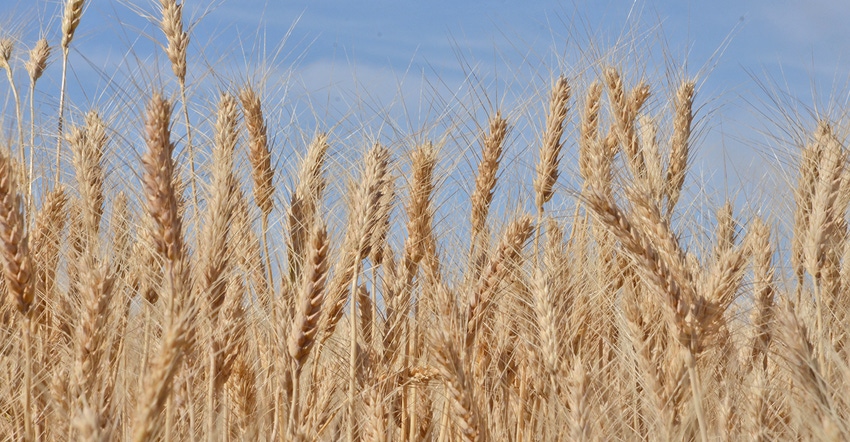January 11, 2019

Wheat researchers at Washington State University have built a reputation for finding new ways to improve wheat, but where can you turn if you have an interesting idea and need funding? At WSU, the answer is an endowment started decades ago by an innovative wheat researcher.
Orville Vogel helped breed new dwarf wheat plants that were the foundation of what became the Green Revolution. Those plants put more energy into their heads than into stalks, boosting yields and feeding more people.
That work earned Vogel the National Medal of Science in 1976. Vogel, who died at 83 in 1991, spent years building an endowment at WSU for wheat research. He even went on the road to ask farmers to give back, matching their contributions and giving the first $26,000 donation.
The Orville A. Vogel Wheat Research Fund has become a key nursery for new ideas. The fund offers three-year, $150,000 grants that help researchers build new collaborations and fill knowledge gaps that solve challenges for wheat growers in the Pacific Northwest.
Scot Hulbert, interim associate dean for research, WSU College of Agricultural, Human and Natural Resource Sciences, said that Vogel’s research “transformed the wheat industry, and the fund that he created continues to do that. The recipients of this fund are pushing his revolution forward. Their success underscores the great importance of donations like Orville’s in putting new ideas to work.”
Vogel-funded projects
Karen Sanguinet and a team of researchers and students are sampling, growing and testing heritage wheats from around the world, as well as modern strains from the Pacific Northwest. They’re studying genes and proteins that let some plants survive drought that would cripple most varieties.
Her work involves hunting for a specific family of proteins involved in stress tolerance. Most plants have four of those genes, but wheat has 20 that encode at least 24 different protein forms. The key is finding which of those genes is important.
Noted Sanguinet: “This is exploratory work. But ultimately, these genetic markers can be used in a breeder’s toolbox to develop varieties that can survive harsh conditions — ultimately helping feed more people in a changing climate.”
She explained that as a new principal investigator, the Vogel fund helped establish her program. The result is that her team is ready to publish three academic papers and branch beyond genomics into a new area — multilevel-omics. This is the study of an organism’s genes, proteins, phenotypes and ionic balance to gain a complete picture of life processes. The work holds promise for new development opportunities for wheat.
Taking on stripe rust
Xianming Chen is a USDA plant pathologist and adjunct professor at WSU. His work involves combating the stripe rust that costs wheat growers millions of dollars annually. Chen and his team map genes that help plants resist rust. The aim is to help breed rust-fighting wheat that’s more profitable and sustainable.
Vogel funding lets Chen offer work and research opportunities to graduate and undergraduate students in his lab. The work helped support doctoral graduate student Lu Liu’s work into how genes in important Pacific Northwest wheat cultivars can offer long-term protection against the disease.
Chen explained that Lu came to WSU on a scholarship that didn’t cover all the costs of being a student. “The Vogel fund paid for her costs, supplies and a fifth year in school. Without it, she wouldn’t have completed her doctorate,” or have made “research strides that help us find new tools to battle stripe rust.”
Battling the drought challenge
The climate is changing, and that’s putting stress on current wheat cultivars. Andrei Smartenko, a biologist in WSU’s molecular plant sciences department, is working to select for better, stronger wheat varieties. His work uses the Vogel funds to support study of cellular molecules and reactions involved in response to drought and stress.
Smartenko explained: “From wild ancestors, we’ve developed robust, drought-tolerant varieties. But it’s an arms race. The climate is changing and becoming unpredictable. We need to find out how we can make wheat even more drought-tolerant.”
In his work, Smartenko studies molecules and reactions that happen in plant cells when they respond to drought. He is building a bigger picture of how different markets and molecules come together to make cells stronger under stress, ultimately helping plants survive in drought. His novel hypothesis on how these molecules function needed support to test the idea.
Smartenko explained that the fund supported his hypothesis and invested in his ideas. That allowed him to build a team and generate data that showed strong support for his original hypothesis. Those findings led to new grants from the USDA, BioAg (administered through WSU’s Center for Sustaining Agriculture and Natural Resources) and the Civil Research and Development Fund, boosting Smertenko’s ability to deliver useful discoveries.
Source: Washington State University, which is solely responsible for the information provided and is wholly owned by the source. Informa Business Media and all its subsidiaries are not responsible for any of the content contained in this information asset.
You May Also Like




